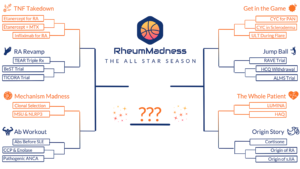RheumMadness is back for its third season, and everyone who is crazy about rheumatology is welcome to play. That includes practicing rheumatologists, fellows, residents, medical students, advanced practice providers, other healthcare professionals and patients. Basically, if you are reading this article, you can play RheumMadness.
RheumMadness is an online tournament in which a bracket of teams, representing key learning concepts in rheumatology, compete against each other in a series of head-to-head match-ups, much like basketball teams in the NCAA (National Collegiate Athletic Association) March Madness tournament. Participants learn about these concept teams by reviewing scouting reports (i.e., topic summaries—created by dozens of rheumatology fellows and practicing rheumatologists).
After learning about the concept teams, participants fill out their own brackets, attempting to predict the teams that will win each match-up. Playing RheumMadness is easy and free.
The true winners of each match-up are selected by consensus of a blue ribbon panel of judges based on its perception of which teams represent the most important, impactful and exciting concepts in the tournament. Participants get points when their picks match those of the blue ribbon panel, and the participants with the most correct predictions will be crowned the winners of RheumMadness.
If that sounds confusing, don’t worry—we provide ample instructions along the way.
RheumMadness is supported by a Clinician Scholar Educator Award from the Rheumatology Research Foundation (Dr. Leverenz is principal investigator) and modeled after the NephMadness tournament in nephrology. To learn more, head to the RheumMadness website.
The All-Star Season
The theme of RheumMadness 2023 is the All-Star Season. Each of the 22 teams in the tournament is based on one all-star article competing to be named the most important and transformational article ever written in the field of rheumatology (see Figure 1). The teams represent a diverse array of manuscripts, from the earliest descriptions of rheumatic diseases to theories of basic immunologic mechanisms and some pivotal trials that fundamentally shifted treatment outcomes in rheumatology.
Fellows and attendings from 19 fellowship programs and two private practice groups chose these teams and created scouting reports to teach participants why they think each team has a chance to win it all. By engaging in this tournament, participants will have a chance to explore how the field of rheumatology developed into what it is today, gaining a deeper understanding of what it means to be a rheumatologist. Participants are challenged to press onward to even more transformational discoveries in the future.




